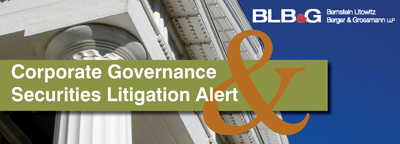Second Circuit Certifies Barclays Securities Class Action Reaffirming Critical Investor Right to Rely on the Integrity of Market Prices
November 7, 2017

The United States Court of Appeals for the Second Circuit yesterday issued an opinion in Waggoner v. Barclays PLC, No. 16-192-cv (2d Cir. Nov. 6, 2017), affirming the district court’s decision certifying the case as a class action.
Barclays Decision Adds Weight to “Fraud-on-the-Market” Protections for Investors
For decades, investors have relied on the “fraud-on-the-market” presumption, a fundamental principle of modern economics providing that the price of securities traded in well-developed (i.e., "efficient") markets generally reflects all publicly available material information about the company. Thus, a material public misrepresentation distorts the company's stock price, and anyone who purchases the stock at the market price is presumed to have relied on the misrepresentation.
Reliance on the fraud-on-the-market, or “efficient market,” doctrine has come under legal challenge in recent years, and yesterday’s Barclays decision by the Second Circuit is a resounding victory for the plaintiffs, a significant win for investor rights more broadly, and a valuable precedent on several important points of law:
- Plaintiffs’ burden to show market efficiency in order to benefit from the fraud-on-the-market presumption of reliance at class certification is light. Indirect evidence of market efficiency, such as high trading volume and coverage by multiple analysts, can be sufficient, and plaintiffs are not required in every case to present direct evidence of efficiency—that is, evidence that the security’s price moved in response to new material information about the company.
- Although defendants may rebut the fraud-on-the-market presumption, they must do so by a preponderance of the evidence.
- Evidence that the security’s price did not increase in response to defendants’ alleged false statements does not suffice to rebut the presumption, because plaintiffs are entitled to rely on a “price maintenance theory” that the false statements maintained artificial inflation in the price without increasing it.
- Plaintiffs’ burden of demonstrating at class certification that damages can be calculated on a class-wide basis is not demanding and can be satisfied by showing that the calculation is possible without actually performing it in detail.
To view the decision click here.
BLB&G and NCPERS Amicus Brief Representing over $3 Trillion in AUM in Support of Plaintiffs in Barclays
Bernstein Litowitz Berger & Grossmann LLP (“BLB&G”) submitted an amicus curiae brief in the Court of Appeals on behalf of the National Conference on Public Employee Retirement Systems (“NCPERS”) supporting the plaintiffs in this action. NCPERS represents more than 500 pension funds and nearly $3 trillion in pension assets held in trust for approximately 21 million public employees and retirees throughout the United States and Canada. Both NCPERS and BLB&G believe that ongoing advocacy such as the amicus effort in Barclays gives needed voice to the institutional investor community’s concerns, influences courts ruling on these issues, and is critical to obtaining positive outcomes in the fight to protect investor rights.
BLB&G is proud to have been able to represent NCPERS in this matter.